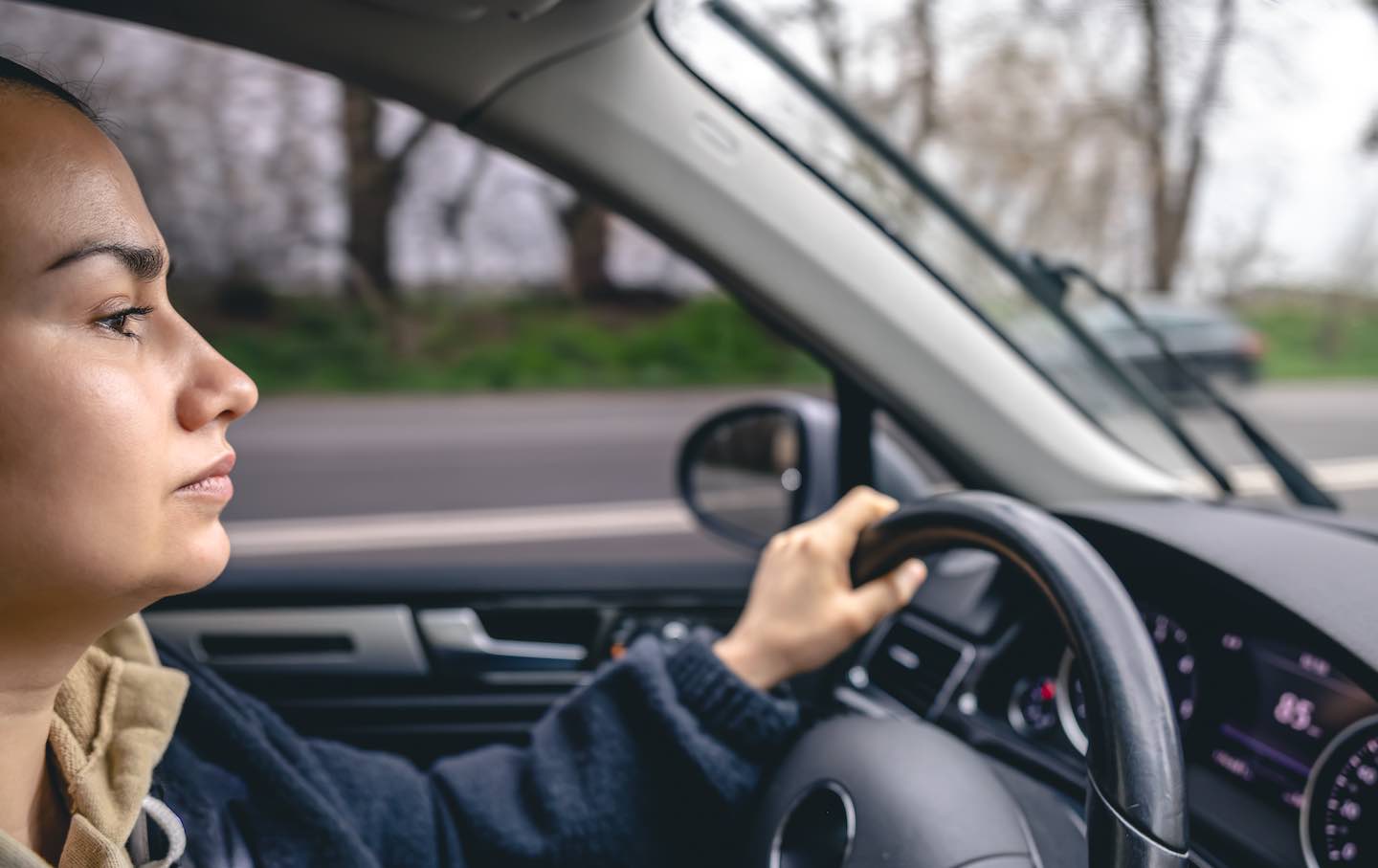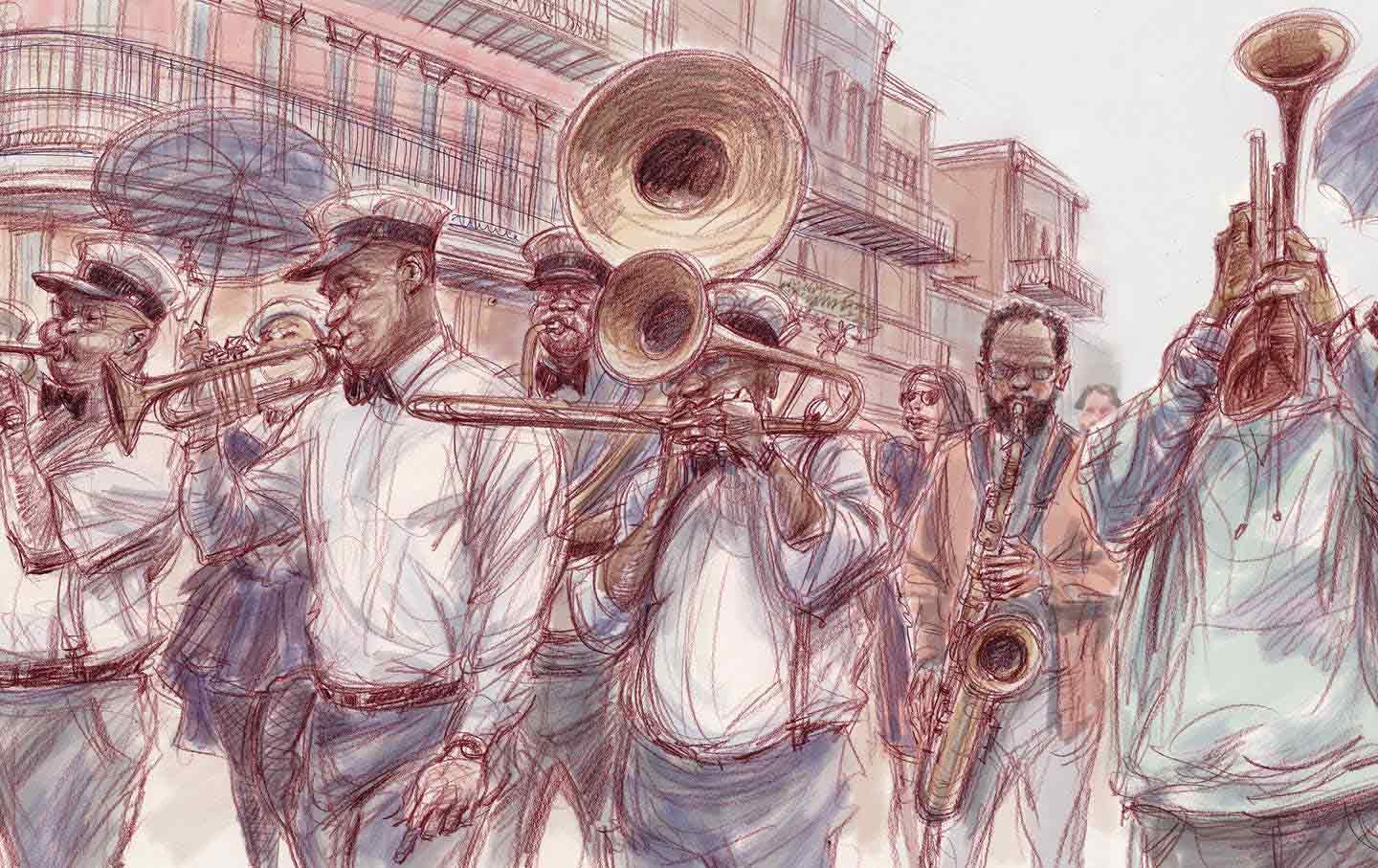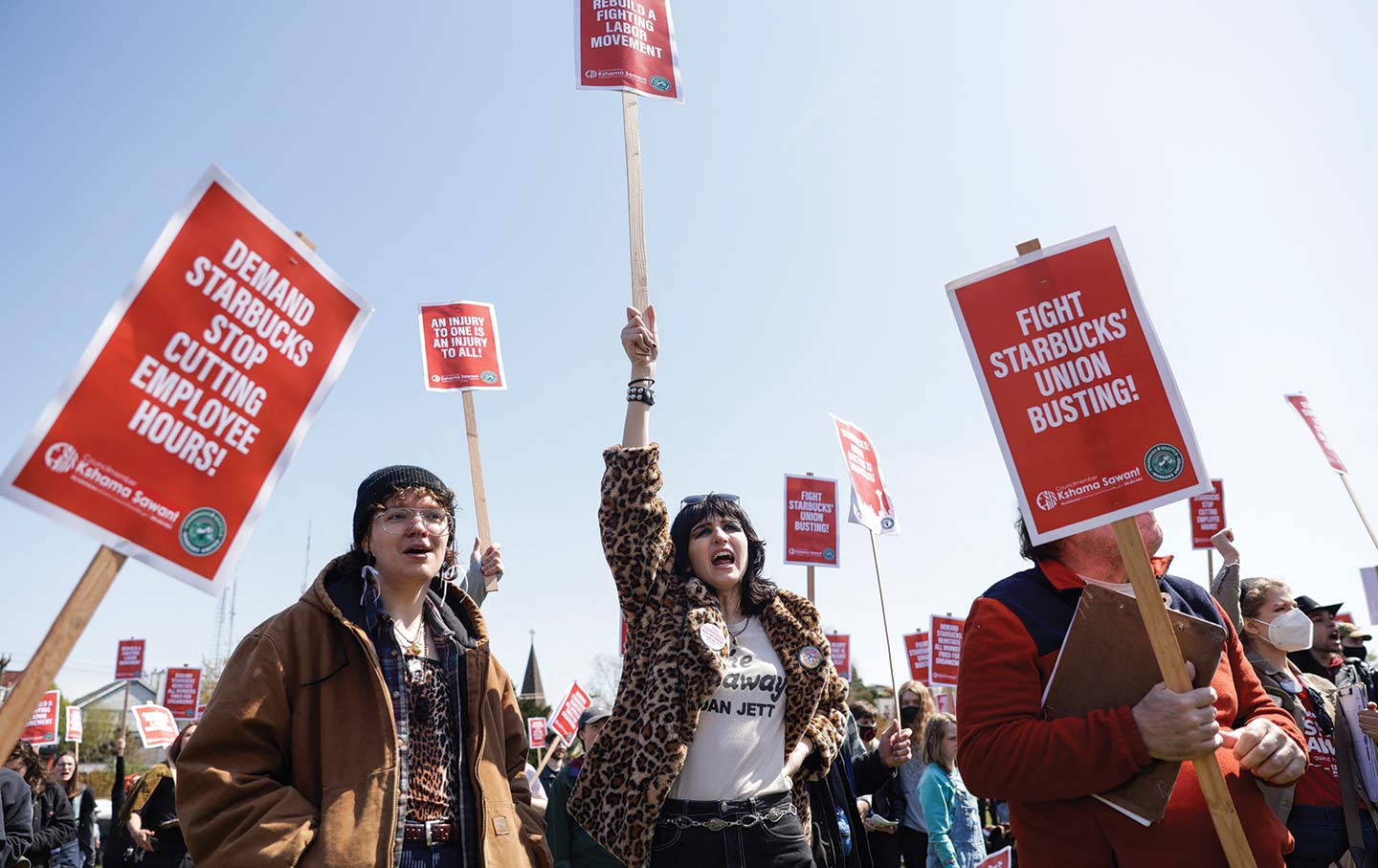Why I Drive Out of State for Prenatal Care
An abortion ban in my home state of South Dakota is likely to leave doctors unable to treat me should I experience a severe complication.

I’m driving down I-90 on a beautiful, cloud-free day, desperately looking for the Highway 34 exit that will take me north to Pipestone, Minnesota. Somehow, I managed to successfully drop off my two sons, 10 and 5, at their respective schools on time—a miracle by any supernatural standard—but that accomplishment feels shallow now that I will no doubt be late to my ob-gyn appointment. Again.
As I anxiously eye the clock on my dashboard and silently will the driver in front of me to step on the gas, I find myself sinking further into something resembling a rage-induced depression. It shouldn’t be this way, I tell myself.
I should be driving a carefree 15 minutes from my sons’ schools to Sioux Falls, South Dakota, in order to receive standard, necessary prenatal care. I should be scheduling ob-gyn appointments with a team of qualified physicians located in my home state. I should be cared for by members of my own community, closer to my house where I work and my children play and I feel the most safe.
But as a 37-year-old woman with a high-risk pregnancy and a history of devastating pregnancy-related complications, I do not feel safe seeking care in South Dakota, a state with a near-total abortion ban. So I drive nearly an hour away to nearby Minnesota every two weeks (soon to be once a week), where abortion access is legal.
On June 24, 2022, immediately after the Supreme Court overturned Roe v Wade, South Dakota banned all abortions, with a very narrow exception when “there is appropriate and reasonable medical judgment that performance of an abortion is necessary to preserve the life of the pregnant female.” It is a Class 6 felony to administer, prescribe, or procure an abortion in the state illegally.
Like the 20 other states that ban or severely restrict abortion in a post-Roe world, South Dakota physicians are now left confused by vague abortion exception language, leaving many too afraid to treat pregnant patients facing severe complications, including hemorrhages, miscarriages, and ectopic pregnancies.
As Erica Schipper. Sioux Falls physician and former chair of the South Dakota chapter of American College of Obstetricians and Gynecologists, told the local paper South Dakota Searchlight, “It’s impossible to itemize every situation where ending a pregnancy might be necessary to protect the health of the mother, and we shouldn’t have to demonstrate evidence of imminent death to care for these patients without fear of a felony charge.”
But that’s exactly what is happening, and it is proving to be a deadly calculus. Studies have found that abortion bans are linked to increased maternal mortality rates and have resulted in increased morbidity as well as long-term health effects, like “loss of fertility, chronic pelvic pain due to infection or surgery, or heart attack and stroke related to uncontrolled hypertension, as well as effects on mental health.”
So far, two women—28-year-old Amber Nicole Thurman and 41-year-old Candi Miller—have died as a direct result of Georgia’s abortion ban. Miller was too afraid to visit a doctor after she experienced an incomplete abortion—a rare complication—“due to the current legislation on pregnancies and abortions,” according to her surviving family.
Thurman was denied immediate care after she experienced the same complication—she waited 20 hours in a hospital bed before doctors were willing to conduct a routine procedure to clear the remains of a terminated pregnancy in her uterus. “By then it was too late,” ProPublica reports.
If abortion is banned nationwide—a policy floated and endorsed by many Republican legislators—researchers believe maternal deaths would rise by at least 24 percent for all women. The projected figure is even higher for Black women, at 39 percent.
These are the concerns that overwhelm my mind whenever my stomach tightens and I try to calmly breathe through another Braxton-Hicks contraction. It’s why I have an “oh-shit plan”—the carefully detailed steps my family members will be forced to take should I go into early labor or start bleeding or experience some other impossible-to-foresee pregnancy complication.
My cousin—an hour and a half away—will take my children, probably from her mother- and father-in-law who, thankfully, only live five minutes away. If I can, I will drive to Minnesota myself—how hard is it to wash blood out of a driver’s seat? I often wonder—and if I can’t, my brother or (maybe if he’s home from his travel job) my husband or perhaps my cousin’s brother-in-law will drive me across state lines.
This intricate web of family support is now part of my “birth plan.”
When I’m driving a two-hour round trip to make an hour- or two-long ob-gyn appointment in the middle of a work day while my children are at school, I think of all the women who do not have the same burdensome and potentially life-saving option.
Women like Amanda Zurawski, Jaci Statton, Kaitlyn Joshua, and the untold number of pregnant people who were and are at the mercy of their home state’s cruel abortion restrictions. Women like Amari Marsh, Brittany Watts, and the at least 210 women who had their pregnancy outcomes criminalized in the first year after Roe was overturned.
An estimated 25 million women now live in states with bans or more restrictions on abortion since the Dobbs ruling, many of whom cannot carry the financial, logistical, or emotional burden of traveling out of state for adequate medical care. Nor should they have to.
I don’t know how much money I have spent on gas, or how many hours I have wasted ensuring that my health insurance covers out-of-state medical costs. I can’t decipher what percentage of the decline of my mental health is just a history of perinatal and postpartum depression rearing its ugly head and what is a direct result of feeling inherently unsafe in a state helmed by legislators who claim to “value all life”… just not my own.
Popular
“swipe left below to view more authors”Swipe →I don’t know if my body will let me down as it has before, and fail to carry my very wanted pregnancy safely to term so that I can give birth in a hospital I have never visited in a state I do not call home. But I do know that I am incredibly lucky to live so close to the Minnesota border. I know that I am privileged to be able to afford to travel out of state and to have insurance and a doctor relatively nearby who will help me, no matter the circumstance.
I also know that I am one severe pregnancy complication away from landing in a South Dakota emergency room where a doctor is too afraid to help me because of state politicians and their cruel anti-abortion policies. I know my joyfully oblivious sons, who cannot wait to meet their future sibling, are unaware that the legislators in charge of their home state believe it’s “pro-life” to allow their mother to die.
I know that there is hope—that Dakotans for Health, a group of grassroots organizers, are fighting for South Dakota Amendment G, a ballot measure that would codify the right to an abortion in the state’s Constitution. I know that even though Measure G will come too late for me, it could help prevent the next pregnant person from traveling out of state for care.
And I know that just like today, I’ll probably be 30 minutes late to my next ob-gyn appointment, too.
Disobey authoritarians, support The Nation
Over the past year you’ve read Nation writers like Elie Mystal, Kaveh Akbar, John Nichols, Joan Walsh, Bryce Covert, Dave Zirin, Jeet Heer, Michael T. Klare, Katha Pollitt, Amy Littlefield, Gregg Gonsalves, and Sasha Abramsky take on the Trump family’s corruption, set the record straight about Robert F. Kennedy Jr.’s catastrophic Make America Healthy Again movement, survey the fallout and human cost of the DOGE wrecking ball, anticipate the Supreme Court’s dangerous antidemocratic rulings, and amplify successful tactics of resistance on the streets and in Congress.
We publish these stories because when members of our communities are being abducted, household debt is climbing, and AI data centers are causing water and electricity shortages, we have a duty as journalists to do all we can to inform the public.
In 2026, our aim is to do more than ever before—but we need your support to make that happen.
Through December 31, a generous donor will match all donations up to $75,000. That means that your contribution will be doubled, dollar for dollar. If we hit the full match, we’ll be starting 2026 with $150,000 to invest in the stories that impact real people’s lives—the kinds of stories that billionaire-owned, corporate-backed outlets aren’t covering.
With your support, our team will publish major stories that the president and his allies won’t want you to read. We’ll cover the emerging military-tech industrial complex and matters of war, peace, and surveillance, as well as the affordability crisis, hunger, housing, healthcare, the environment, attacks on reproductive rights, and much more. At the same time, we’ll imagine alternatives to Trumpian rule and uplift efforts to create a better world, here and now.
While your gift has twice the impact, I’m asking you to support The Nation with a donation today. You’ll empower the journalists, editors, and fact-checkers best equipped to hold this authoritarian administration to account.
I hope you won’t miss this moment—donate to The Nation today.
Onward,
Katrina vanden Heuvel
Editor and publisher, The Nation








